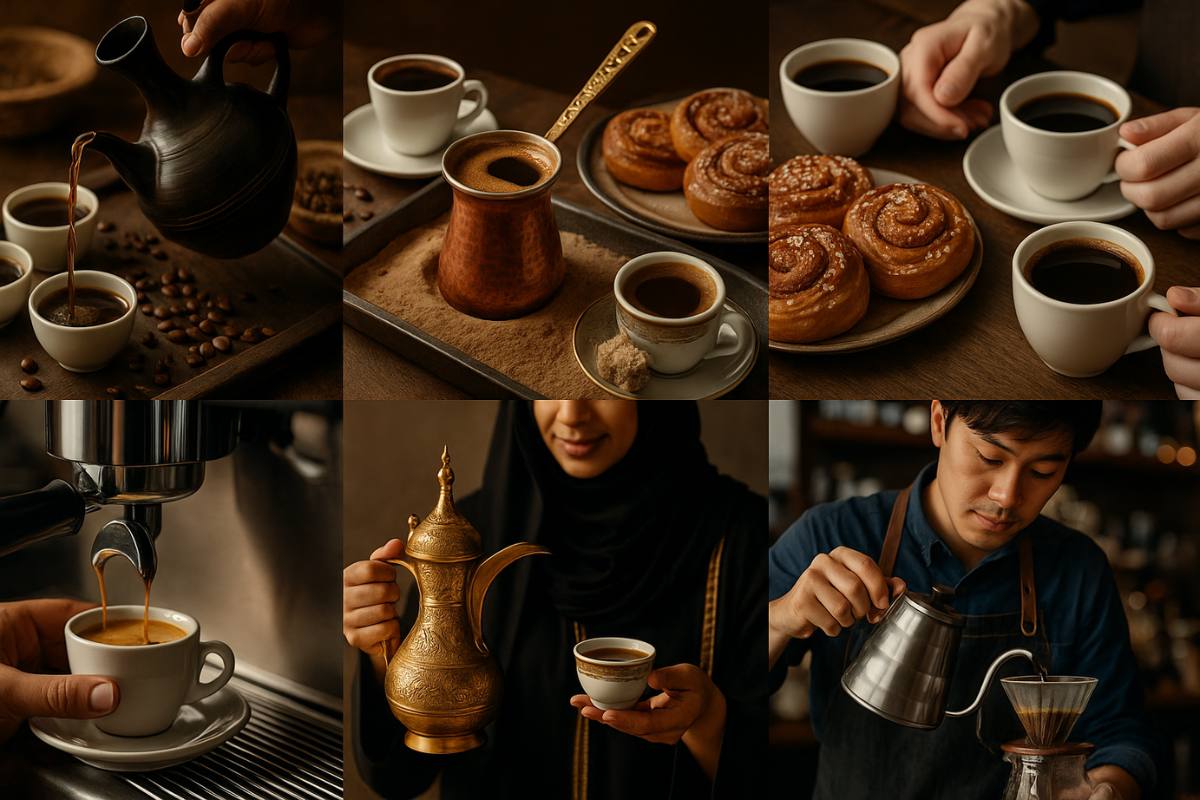Coffee isn’t just a drink—it’s a cultural symbol, a shared experience, and a social ritual across the globe. While many of us associate coffee with productivity or a quiet morning at home, in many countries coffee holds a far deeper meaning. From sacred ceremonies to everyday hospitality, the way people drink and serve coffee reveals a lot about their traditions, values, and sense of community.
In this article, we’ll explore how coffee plays a role in social and cultural rituals in different parts of the world.
Ethiopia: The Spiritual Home of Coffee
Ethiopia is considered the birthplace of coffee, and its cultural significance is deeply rooted in history. The Ethiopian coffee ceremony is a beautiful, slow ritual that symbolizes respect, hospitality, and community.
- Green coffee beans are roasted over an open flame
- The beans are ground and brewed in a traditional jebena (clay pot)
- The coffee is served in three rounds: Abol, Tona, and Baraka
- Guests are invited to sit, talk, and share stories
This ceremony can last hours, showing how coffee is a sacred connector between people—not something to be rushed.
Turkey: Coffee as a Symbol of Hospitality
In Turkey, coffee is much more than a beverage—it’s a gesture of politeness and warmth. Turkish coffee is known for its strong flavor, rich foam, and unfiltered brewing method. Traditionally, it’s served in small cups alongside a glass of water and something sweet, like Turkish delight.
Coffee is also part of Turkish marriage customs. When a man asks for a woman’s hand in marriage, the bride-to-be prepares a cup of Turkish coffee—sometimes adding salt instead of sugar to test the groom’s patience!
The phrase “a cup of coffee commits one to forty years of friendship” (bir fincan kahvenin kırk yıl hatırı vardır) reflects how deeply coffee is tied to relationships in Turkish culture.
Sweden: Fika and the Art of Slowing Down
In Sweden, coffee is central to a beloved cultural tradition known as fika. Fika is not just a coffee break—it’s a moment to pause, unwind, and connect with others. Typically enjoyed with pastries like cinnamon buns or cookies, fika is part of daily life for many Swedes.
In offices, homes, and cafés, fika promotes a sense of work-life balance, well-being, and human connection. It reminds us that coffee isn’t just fuel—it’s a reason to stop and share a moment.
Italy: Espresso and Everyday Ritual
In Italy, coffee is a fast but essential ritual. Italians often drink espresso standing at the bar, engaging in quick social interactions throughout the day. Coffee breaks, or pausa caffè, are sacred even in the busiest work schedules.
Rules are unwritten but followed closely:
- No cappuccino after breakfast
- Espresso is served in tiny porcelain cups
- Sugar, never milk, is added after lunch
Italian coffee culture is about precision, tradition, and shared identity—with each cup reinforcing a sense of national pride.
Brazil: Coffee as a Symbol of Generosity
Brazil is one of the largest coffee producers in the world, but it’s also a place where coffee is an expression of hospitality. When you visit someone’s home, you’ll almost always be offered a cup of cafézinho—a small, sweet coffee served in a tiny cup.
Cafézinho represents more than refreshment; it says “you’re welcome here.” Even if someone doesn’t have much, they’ll still make a point to offer you coffee—demonstrating the value of kindness and inclusion.
Saudi Arabia: Tradition and Ceremony
In Saudi Arabia and across the Arabian Peninsula, coffee is part of a ceremonial experience called qahwa. Served in a dallah (traditional coffee pot), this spiced coffee is brewed with cardamom and sometimes saffron or cloves.
The host pours qahwa into small cups called finjan, offering it with dates. Guests receive three servings, with the right hand, and signal when they are finished by shaking the cup slightly.
Qahwa reflects respect, generosity, and hospitality, especially during important gatherings like weddings or visits during Ramadan.
Japan: The Rise of Third-Wave Coffee Culture
While Japan wasn’t historically known for coffee, it has developed a sophisticated coffee culture rooted in precision and aesthetics. From pour-over cafés to siphon brewing bars, Japanese coffeehouses emphasize ritual, silence, and care.
Coffee shops often resemble tea houses, with minimal décor, quiet ambiance, and hand-crafted techniques. In Japan, coffee has become a symbol of contemplation, solitude, and craftsmanship.
United States: Coffee as Social Convenience
In the U.S., coffee has evolved into a culture of convenience, mobility, and choice. The rise of coffee chains like Starbucks helped popularize to-go culture, flavored drinks, and personalization—venti, non-fat, extra shot, half-sweet? No problem.
But beyond the grab-and-go mentality, there’s also a thriving third-wave coffee scene that emphasizes small-batch roasters, sustainability, and community cafés. Here, coffee is both individual expression and community anchor.
Final Thoughts: Coffee as a Global Connector
Across continents and centuries, coffee has adapted to local customs while maintaining its role as a social bridge. Whether it’s part of an elaborate ceremony or a casual moment among friends, coffee continues to unite people through its warmth and ritual.
By understanding how coffee is woven into cultures around the world, we deepen our appreciation not just for the beverage—but for the people and traditions that surround it.
So next time you sip your coffee, think of the millions doing the same—each with a story, a ritual, and a reason to connect.
